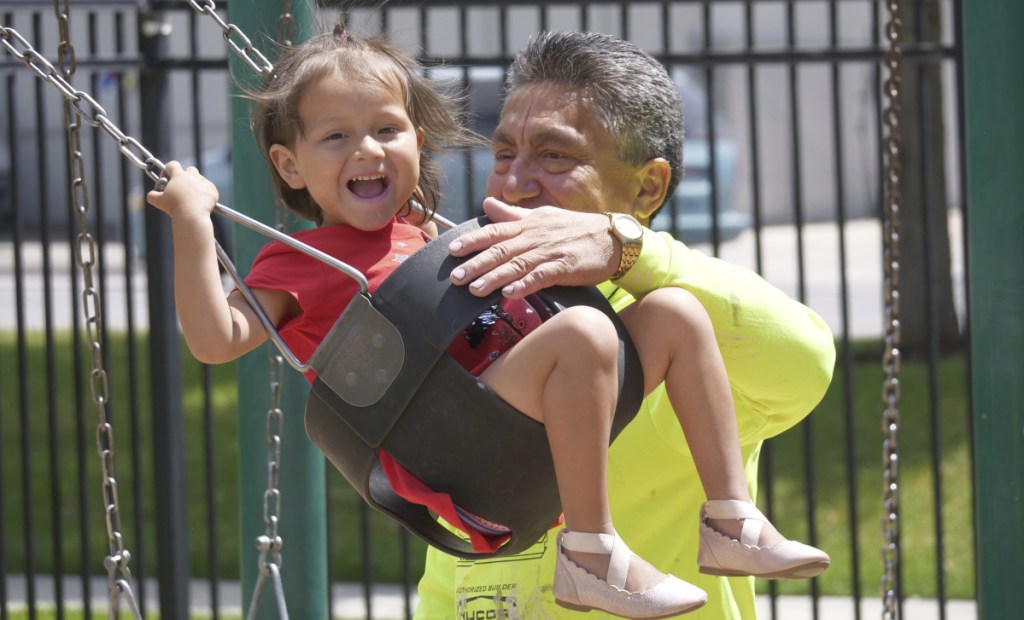PROVO, Utah — Three-year-old Genesis Gonzalez Lopez giggled excitedly as she played with her father at a sunny Utah park, zipping down a slide again and again into his arms.
The happy scene this week in Provo, south of Salt Lake City, was a far cry from what the pair experienced on Thanksgiving, when U.S. immigration authorities took Romulo Gonzalez Rodriguez into custody at the U.S.-Mexico border and whisked away the frightened girl, with no explanation of where she’d end up.
Gonzalez had fled Guatemala with the then-2-year-old after kidnappers held him captive, ripped out his right eye and forced his family to pay a $13,500 ransom for his life. He traveled by bus and train to a San Diego port of entry to seek asylum in the United States and was separated from his daughter for seven days.
“It’s painful to be running away and come to where you think they’re going to rescue you, and they take the measure of separating children,” the father said in Spanish on Tuesday. “You fall again into fear and the same anguish that you’re leaving behind.”
LONGSTANDING PRACTICE
Gonzalez’s experience offers a window into the distress and uncertainty parents endure when they are separated from their children at the border, even though it happened before President Trump’s administration in April adopted a “zero tolerance” policy in which all unlawful border crossings were referred for prosecution.
The policy led to a spike in family separations in recent weeks, provoking a national uproar and pressure from some of Trump’s allies. In Gonzalez’s case, it’s unclear why he and his daughter were separated since he surrendered at the border and is not being prosecuted for illegal entry.
It has been longstanding practice for Homeland Security to separate adults and minors at the border when it’s unable to confirm they’re related or if it believes a child is at risk. But Gonzalez has no criminal record, his attorney Mari Alvarado Tsosie said.
The 54-year-old Gonzalez has a brother in Provo who sought Alvarado’s advice after Gonzalez was held for ransom in his home country. Gonzalez followed her instructions, arriving at the San Ysidro Port of Entry with his daughter Nov. 23 and telling U.S. immigration authorities he wanted asylum. He handed them a Guatemalan police report about his kidnapping.
Authorities shepherded his young daughter into another room while Gonzalez answered questions. He thought they would be reunited when he was done, but he was instead taken to a detention center without his daughter, Alvarado said. When he asked where she was, they wouldn’t tell him, he said.
Gonzalez said he then spent seven days at a cold facility where the lights never turned off, wondering if his daughter was safe and if he would ever see her again. In Guatemala, his kidnappers had threated to dismember the child, and he suspected corrupt authorities were involved. His mind raced with worries U.S. law enforcement was corrupt too.
“It’s tremendous anguish because you don’t get any answers from authorities,” Gonzalez said at his attorney’s office in Provo, his daughter sitting on his lap. “They don’t give you information, and you don’t know the laws. … You’re wondering: Where is she? What is she doing? Such a small child.”
MAKING UP RULES AS THEY GO
Parents who surrender at U.S. ports of entry have occasionally been separated from their children with no formal explanation since long before the Trump administration’s zero tolerance policy, said Dan Kowalski, editor of Bender’s Immigration Bulletin, a national journal focused on immigration cases and law. He believes it’s because of a lack of training, leadership and standard operating procedures that allows border agents to make up rules as they go.
If they suspected Gonzalez was abusing the child or trafficking her, they would have sent the case to prosecutors, Kowalski said.
After learning of Gonzalez’s situation, Alvarado began calling every ICE facility in Southern California looking for him and the child. It took her three days to find Gonzalez at San Diego’s Otay Mesa Detention Center and another four days to reunite him with his daughter.
To this day, Alvarado doesn’t know where Genesis was held, though she believes the girl was somewhere in San Diego. All she said is she ate a lot of cereal.
The father and daughter are staying with Gonzalez’s brother while they await word on the asylum request. A hearing is set for Oct. 22.
Gonzalez’s wife and two stepchildren are in hiding in Guatemala and waiting until he can send enough money for them to make the journey north.
Copy the Story LinkSend questions/comments to the editors.



Success. Please wait for the page to reload. If the page does not reload within 5 seconds, please refresh the page.
Enter your email and password to access comments.
Hi, to comment on stories you must . This profile is in addition to your subscription and website login.
Already have a commenting profile? .
Invalid username/password.
Please check your email to confirm and complete your registration.
Only subscribers are eligible to post comments. Please subscribe or login first for digital access. Here’s why.
Use the form below to reset your password. When you've submitted your account email, we will send an email with a reset code.